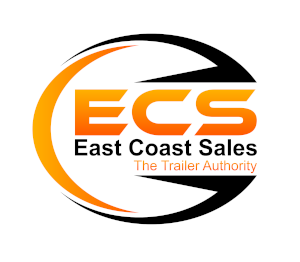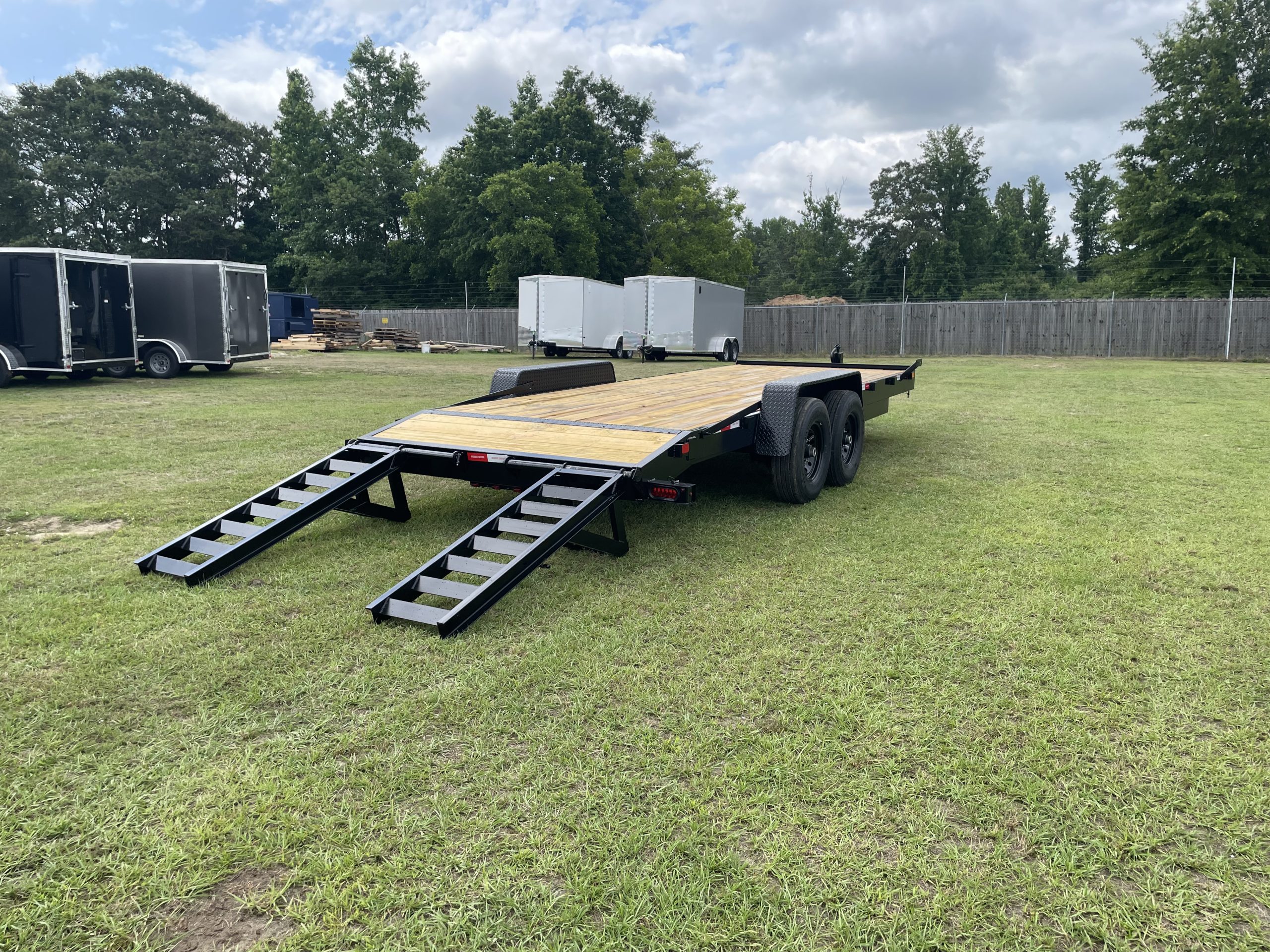Car Trailer purchase tips in Raleigh North Carolina
Purchasing a car trailer in Raleigh, North Carolina can be a big investment, especially if you plan to use it frequently for hauling vehicles or equipment. Whether you’re transporting a car, truck, motorcycle, or other vehicles, it’s important to choose the right trailer for your needs. Here are some tips to help you make an informed purchase:
- Determine the Type of Car Trailer You Need
Car trailers come in a variety of types, each suited for different purposes. Here are some common options:
- Open Car Trailers:
- Best for: Transporting cars or trucks when weather protection is not a major concern.
- Size: Typically available in 7’ x 14’ to 8’ x 20’ sizes.
- Advantages: These trailers are lighter, more affordable, and allow for easier loading and unloading. They are also usually more versatile for hauling different types of vehicles.
- Disadvantages: Exposed to the elements, so not ideal for long-distance travel with expensive cars or those that need protection from the weather.
- Enclosed Car Trailers:
- Best for: Hauling valuable, classic, or luxury cars that need to be protected from the elements.
- Size: Available in sizes ranging from 7’ x 14’ to 8’ x 28’ or more.
- Advantages: Provides protection from rain, dust, and road debris. Great for keeping your vehicle secure and safe from theft.
- Disadvantages: More expensive, heavier, and requires more towing capacity. Also, less visibility compared to open trailers.
- Tilt Deck Trailers:
- Best for: Hauling low-clearance vehicles or equipment, or when you don’t want to use ramps.
- Advantages: The trailer tilts downward, making it easier to load and unload vehicles without needing additional ramps.
- Disadvantages: Generally more expensive, and may not have the same load capacity as a traditional flatbed trailer.
- Car Hauler Trailers with Ramp:
- Best for: Cars, trucks, or motorcycles that need easy access for loading.
- Advantages: Includes a ramp for easy loading and unloading. Many models are designed with adjustable axles for improved weight distribution.
- Disadvantages: Ramps can sometimes be difficult to manage or maneuver, especially when you’re dealing with heavier vehicles.
- Know Your Towing Capacity
Before purchasing a car trailer, you need to be sure your tow vehicle (usually a truck or SUV) can safely handle the weight of both the trailer and the vehicle you plan to tow. Check your vehicle’s towing capacity by referring to the owner’s manual, or consult the vehicle’s manufacturer specifications.
- Gross Vehicle Weight Rating (GVWR): This is the total weight of the trailer plus the maximum weight it can safely carry. Make sure that your tow vehicle’s towing capacity is greater than the GVWR of the trailer, including the vehicle you intend to haul.
- Payload Capacity: This refers to the maximum weight the trailer can safely carry, not including the weight of the trailer itself. Ensure it matches your needs for the car or equipment you’re transporting.
- Consider the Weight of the Car You’re Hauling
Think about the weight of the vehicle(s) you plan to transport. You’ll want a trailer that provides adequate capacity for the car, but also one that can be safely towed by your vehicle.
- Standard Cars: Most standard sedans or small trucks weigh between 3,000 and 4,000 lbs.
- Larger Trucks/SUVs: Heavy-duty vehicles, like full-sized trucks, often weigh 5,000 lbs or more.
- Sports Cars or Custom Vehicles: Classic cars, sports cars, or low-clearance vehicles may have unique weight distribution needs. If you’re transporting a low-sitting or modified vehicle, you might want to opt for a tilt deck trailer or a lower profile open trailer.
- Check the Trailer’s Axles and Suspension
Axles and suspension play a critical role in the performance of the trailer, especially when towing heavy vehicles over long distances.
- Single vs. Tandem Axles:
- Single Axle Trailers: These are typically sufficient for lighter vehicles (up to 3,000 lbs). They’re more affordable but may not be as stable at higher speeds or on rough roads.
- Tandem Axle Trailers: Better for heavier vehicles or long-distance hauling. The additional axle offers greater stability, better load distribution, and less wear on the tires and suspension.
- Suspension Type: The type of suspension affects the ride quality and durability of the trailer. Look for leaf spring suspension for heavy-duty trailers, which is more robust for carrying substantial loads.
- Ensure Proper Loading and Tie-Down Features
Make sure the trailer you select has adequate loading and securing options for your car or vehicle.
- Loading Ramps: If you need to load vehicles manually, make sure the trailer includes ramps that are long, wide, and sturdy enough to safely load your car.
- Ramp Styles: Some ramps fold up, while others are permanent. Folding ramps are typically more compact and easier to store.
- Tilt Decks: If you don’t want to mess with ramps, tilt deck trailers are a great option that simplifies the loading process.
- Tie-Down Points: A car trailer should have sufficient tie-down points to secure the vehicle properly. This could be in the form of D-rings or E-track systems for adjustable tie-downs. Make sure they’re located in strategic places on the deck so you can secure the vehicle by the tires or chassis.
- Straps and Chains: Always check the tie-down straps for their weight rating and make sure they are in good condition. You’ll want ratchet straps or chains to safely secure your vehicle in place, especially if you’re transporting an expensive or valuable car.
- Review Trailer Materials and Construction
The build quality of the trailer is important for durability, weight, and ease of towing.
- Steel vs. Aluminum:
- Steel Trailers: Steel is more durable and tends to be less expensive, but it’s also heavier and can rust over time, especially in humid environments like Raleigh. If you choose steel, be sure it has a protective coating to resist corrosion.
- Aluminum Trailers: Lighter than steel, aluminum trailers resist rust and corrosion better. They’re a good option if you plan to frequently tow in wet conditions, such as through Raleigh’s rainy seasons. However, they tend to cost more.
- Flooring Material: The floor of the trailer should be sturdy enough to support the weight of the vehicle. Wooden floors are common but can wear over time. Some car trailers come with metal or diamond plate floors, which are more durable and easier to maintain.
- Check the Trailer’s Tires
The quality of the trailer’s tires is essential for a smooth and safe towing experience.
- Load Rating: Tires should be rated for the weight they will carry. Ensure that the tires on the trailer match the GVWR of the trailer.
- Spare Tire: Many car trailers offer the option to purchase a spare tire. It’s worth considering, especially if you’re towing long distances, as it can save you time and frustration in case of a flat tire.
- Verify Trailer Safety Features
Safety features on the trailer are essential to ensure that it stays secure while you’re on the road. Some important features to look for include:
- Brakes: In North Carolina, trailers with a GVWR over 3,000 lbs are required to have brakes. Even if it’s not required by law, brakes on a trailer improve control, especially when towing heavy loads.
- Lights and Wiring: Ensure that all lights, including brake lights, turn signals, and running lights, are functional. Poor or broken wiring can lead to fines and dangerous driving conditions.
- Safety Chains: Safety chains are required by law in most areas and provide an additional safety measure if the trailer detaches from the tow vehicle.
- Check Local Regulations
Make sure the trailer you choose meets local laws and requirements in Raleigh, NC. Some things to verify:
- Size Limits: North Carolina law places restrictions on trailer length, width, and weight.
- Towing Regulations: Ensure your vehicle meets the necessary towing capacity and is legally allowed to tow the trailer.
- Consider Future Use
While you may only need to haul one car right now, think about your future needs. If you plan to haul larger vehicles, multiple cars, or heavy equipment in the future, you might want to invest in a larger or more robust trailer.
Conclusion:
When purchasing a car trailer in Raleigh, NC, it’s crucial to choose one that suits your specific needs, whether you’re hauling a single car, multiple vehicles, or equipment. Keep in mind your towing capacity, the weight of the vehicles you plan to haul, the type of trailer (open vs. enclosed), and the durability of materials. By taking these factors into account, you’ll ensure that your trailer is safe, efficient, and suited to your hauling needs.
When you need the very best trailer and only want 5 star customer service come visit us at East Coast Trailer Sales. We are the triangle’s premier trail sales specialist. We can help you select the perfect trailer for your needs and get you on the road quickly. To learn more visit us online at https://www.eastcoastsales.com/ or check out our social media at https://www.facebook.com/eastcoastsalesraleigh . To browse our inventory, please visit https://www.eastcoastsales.com/inventory/ .
To speak to an expert call us at (919) 661-1045 today.

